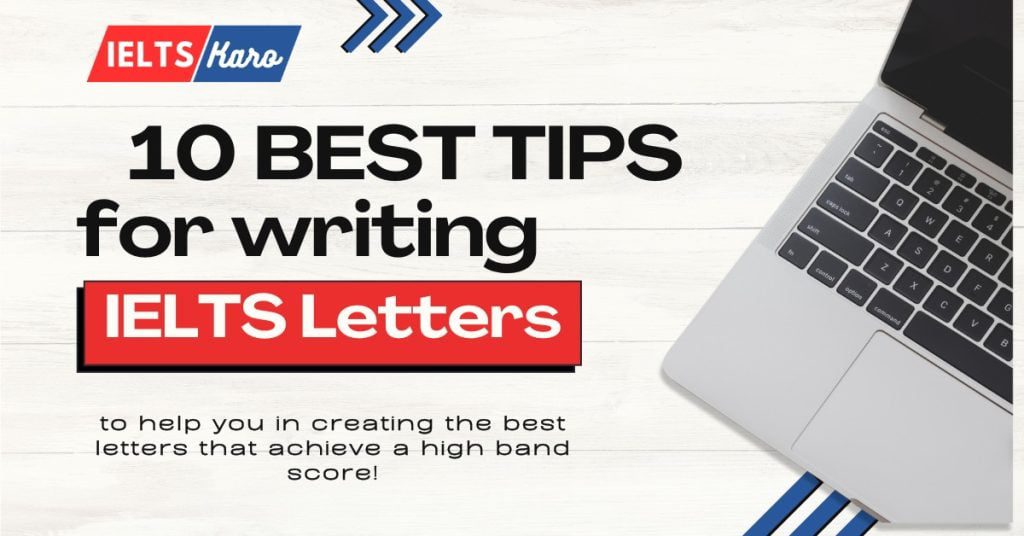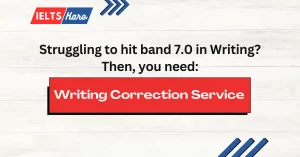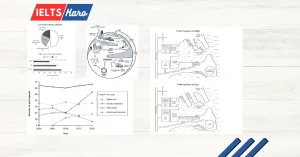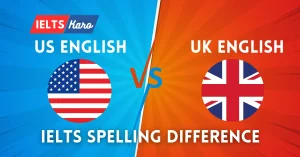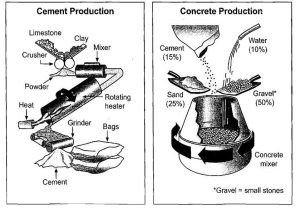10 Tips for Writing IELTS Letter:
An IELTS Writing Task 1 General Letter is not difficult, if you know the right strategies. Many trainers and “experts” try to make it challenging, especially when all you need is to follow instructions and use the right words. On this page, you will explore 10 tips for writing the letter:
- Follow the instructions
- Understand the different types
- What are the objectives and aims?
- How to open?
- How to end and sign off?
- What vocabulary should be used?
- What synonyms should be used?
- What should be the structure?
- How many paragraphs you need to write?
- What is the importance of spelling?
Let’s understand these each one of these.
1. Follow the instructions
The instructions will start off with 2 lines explaining the backdrop, story or the problem. Then it will list 3 bullet points. You are to follow the instructions and write it addressing each bullet point for each paragraph.
Let’s have a look at the following question:
A friend has agreed to look after your house and pet while you’re on holiday.
Writer a letter to your friend. In your letter:
- Give contact details for when you are away
- Give instructions about how to care for your pet
- Describe other household duties
Write at least 150 words. Begin your letter as follows:
Dear ……..
Here are some tips:
- The question paper will ask you to spend at least 20 minutes on this task. The first 3 to 5 minutes should go toward planning. On a separate piece of paper, write the ideas against each bullet point so that you have a structure to follow when answering.
- Take the next 10 to 13 minutes for the answer. Take the last 2 to 3 minutes proofreading, editing and correcting your mistakes. My personal experience showed that you can correct a great deal of errors, such as spelling and grammatical mistakes during proofreading process. I also ended up using some synonyms to avoid repetition.
- Never write less than 150 words. Aim to 160 to 180 words. This is the ideal word count. Only if you must, you can go to 210 words, but nothing more. Extra words will not lead to a high band score unless they resonate with what you’re saying, have no mistakes, and are relevant to the topic. More writing leads to more consumption of time, which we know is NOT on our side ;). Anything longer is a total waste of time. Do not waste your efforts in an attempt to impress the examiner.
- Your Task 1 is worth 1/3, or 33% of your overall band score.
- It is important to write on all three bullet points, or else you will not get a good band score for the Task Achievement Criteria.
- Try to use realistic names. I used “Dear Abrar” when writing on “a faulty office product.” Abrar is a real-life friend of mine, who is an IT expert. This way, I was able to come up with better ideas and write without getting stuck.
- Do NOT memorize anything from the internet and use it. Trust me, the examiner who has already read hundreds of these in the past, will know it from miles away! Always use your imagination. Do NOT write anything you learned by heart from the internet.
2. What are the 3 types?
Task 1 GT is one of the following three types:
- Writing to your friend or family member – Informal
- Writing a letter of complaint – Formal
- Writing to HR for suggestions, or applying for a new job – Semi-formal
Based on the instructions, you will determine the salutations, greetings, opening and closing of your Task 1 General . You will also use the appropriate one accordingly.
Here is an example of an informal style:
You would like to invite your former colleague to visit your city due to the upcoming holidays. Write a letter inviting your friend. In your letter:
- Tell your friend about the upcoming holidays in your city.
- Explain how much the visit would mean to you.
- Suggest that your colleague stays with you at your house.
Whenever you are writing to your family member, relative, friend, or current/former colleague, these are the people in your life that you personally know. Hence, you will address them by their name and use an informal style of writing.
PS: Informal writing DOES NOT mean you start using slangs such as “Yo! Heard you comin’ to ma town boy!”. It does NOT work like this.
You would start off by saying:
Dear Hassan (One of my former colleagues is Hassan),
I am excited to hear that you are visiting my city next month. I cannot wait to take you around the city and explore its cultural hotspots.
Formal Letters
You ordered a product online 2 weeks back. The product should have arrived within 3 days, and despite contacting the company, you have not yet received it. Write a letter to the company. In your letter:
- State the product that you ordered with the order number.
- Explain you contacted the company and did not receive a response.
- Ask for a refund.
You are writing to someone whom you do not know and have no personal relationship with. The person could be a manager or someone with a position to listen to your compliant and act upon it. Some other examples university for admission, a job application, a letter of compliant/dissatisfaction of a product/service, a local union/city union on improper construction work, etc.
You would address the person with a “Dear Sir or Madam”, because not only are you unsure about the name of the person, but also their gender. Hence, we would not proceed with any assumptions here. It usually beings with:
“Dear Sir or Madam,
I am writing to express my dissatisfaction regarding your services. I ordered a product from your website and it has not yet been delivered to my address.”
3. What Are the Objectives and Aims?
Be focused on the actual aims and objectives of penning one. Based on the various types, here is how you know the style based on the instructions given to you:
- Complaints (Mostly formal)
- Invitations (Mostly informal)
- Resignations or applications (Mostly formal)
- Making arrangements (Mostly formal)
- Job Application (Mostly formal, but sometimes could be informal)
- Apology letter (Keep it informal)
You will be informal when writing to someone that you know, and formal to someone you have not met before. This is no different than in our physical environment. You are relaxed and talk casually (informally) with our friends, family members, relative and colleagues. But when you appear for an interview, or meet someone in a professional arrangement such as business meetings or networking events, you resort to using a professional style of talking.
Hope that helps;)
4. How to Open?
You open the letter carefully so that it doesn’t tear apart. Just kidding!
Every letter starts with an opening statement that is of 1 or 2 lines at max. This clearly states the purpose of your writing and the recipient reading it understands why you wrote it in the first place.
Here are two statements. Find out which one is formal and which one the other:
I am writing to express my concern regarding the air ticket I booked through one of your dealers.
I am excited to hear that you are visiting Lahore. I cannot forget the beautiful memories we spent together in this city when we were in our childhood.
I saw an ad for “Social Media Marketing Manager” at your company’s Linkedin profile. Hence, I am interested in applying for this position.
[learn_more caption=”Answer 1″] This is formal. You do not know the name and gender of the person whom you are addressing to.[/learn_more]
[learn_more caption=”Answer 2″] This is an informal letter. You are addressing to your childhood friend that you have spent time with and know personally. Obviously, you also know their name ;)[/learn_more]
[learn_more caption=”Answer 3″] This is informal.[/learn_more]
5. How to Close?
You need to sign off and close your letters with the right choice of words, just like you did at the time of opening it up.
Formal letter, close with Yours faithfully, Yours sincerely
Informal letter, close with Best Regards, Best Wishes
PS: I appeared for my IELTS GT on 30th November 2022 and scored an 8.5, with an 8.5 in Writing!
Here are the openings and closings I used for my Task 1:
Dear Abrar, (Opening)
Regards,
Yasir Saeed (Closing)
Here are some great closing statements:
It will be awesome to meet with you again, cherishing all those years. Pay my regards to your family (informal)
I look forward to hearing from you (formal)
I am confident you will help me by resolving the issues highlighted. (formal)
6. What Grammar you should use?
Based on the writing style, your grammar usage will be varied. While there is no problem in using contractions, such as (I’m, I’ll), our recommendation is to avoid it. If talking about a compliant, you can use the past tense, such as:
I used the product but it did not work as promised. (you are talking about a time in the past when you ordered this product and sharing your frustrating experience)
I want to make a suggestion. Kindly offer me a refund (present tense)
It’s great to know you are paying a visit to my city. We will visit the top places in Lahore and experience the best in food, art and culture. (First sentence, present continuous, second sentence is simple future)
When you use a range of grammatical structures, you will achieve a HIGH band score on the GRA (Grammatical Range and Accuracy) Marketing Criteria. Hence, it is advisable to use different grammatical structures to elaborate your point clearly.
7. What type of vocabulary you should use?
Vocabulary adds flavor to your writing. Using the same word repeatedly leads to boredom, and not to mention, a low band score. It signals the exam instructor that you are not prepared to write well.
“Nah, this candidate does not have enough vocabulary to say the same thing again in new words. I don’t see any synonyms even.” This is what the IELTS examiners think when reviewing bland and boring letters and essays.
So, what type of vocabulary you should really use? Remember, Lexical Resource is an important writing marking criteria that determines the range of vocabulary you are using to express your thoughts and opinions.
Let’s have a look at the vocabulary through my personal experience (Yasir Saeed’s experience):
- You will be contacted when you reach the airport –> I will reach out to you when you arrive at the airport.
- Unfortunately, I would not be able to visit –> Sorry, I will not be able to make it in time.
Here’s a secret word to improve your band score; SYNONYMS!
I used synonyms in my letter to add more flavors to it, and to reduce boring. For example, the work “broken down” has multiple synonyms, such as:
- malfunctioned
- stopped working
- out of order
8. How Important are Spelling and Punctuation?
That’s more like saying “how important is having a driving license to enjoy a car drive?” Spelling and punctuation are the building blocks of any language. Always remember that an English native examiner will be reviewing your letter, and any grammatical, spelling and punctuation mistakes will immediately highlight to him/her.
Once you are done with Task 1, you have to go back, proofread and edit to remove spelling mistakes, improve punctuation and grammar. These carry a LOT of marks. Repeated spelling and punctuation errors will deteriorate your band score, bringing it down to no more than a 6.0, for an otherwise 7+ writing.
Do not let these small errors jeopardize your efforts.
9. What is the Writing and Paragraph Structure?
Follow this structure:
- Paragraph 1: Opening, and stating the reason (after the salutation and greetings)
- Paragraph 2: Explain the first bullet point.
- Paragraph 3: Explain the second bullet point.
- Paragraph 4: Explain the third bullet point.
- Paragraph 5: Wind up with a closing statement
- Last line: Your name
10. How to Plan?
You should ideally spend no more than 5 minutes in planning, and the next 10 to 12 minutes penning it. Take the last 2 to 3 minutes for proofreading, editing and correcting mistakes. Polish it to ensure a high band score.
Don’t forget to follow the above instructions. With that being said, good luck with your IELTS exam and wishing you a high band score.

